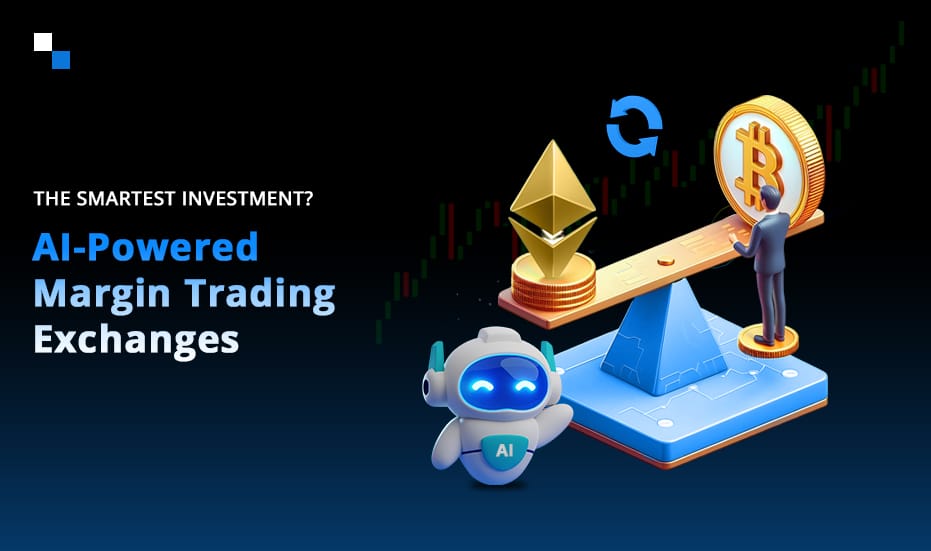
What does it take to Build Trust in a Centralized Cryptocurrency Exchange
March 22, 2024
Top 10 DeFi Trends of 2024: Shaping the Future of Decentralized Finance
March 26, 2024The continuously evolving cryptocurrency landscape has witnessed the emergence of decentralized finance (DeFi) as a revolutionary force. Among its myriad applications, decentralized leverage trading crypto exchange stands out as a promising innovation, offering traders enhanced opportunities for profit while bypassing traditional financial intermediaries.
Let us gain insights into the working of decentralized leverage trading exchanges, their advantages, challenges, and the potential they hold for shaping the future of finance.
Understanding Decentralized Leverage Trading
To comprehend the significance of decentralized leverage trading exchanges, it is essential to understand the underlying concepts.
Decentralization: Traditional financial systems are centralized, relying on intermediaries such as banks and brokers to facilitate transactions. In contrast, decentralized exchanges (DEXs) operate without a central authority, utilizing blockchain technology to enable peer-to-peer trading directly between users.
Leverage Trading: Leverage allows traders to amplify their exposure to an asset by borrowing funds. While this can magnify potential profits, it also increases the risk of losses. In traditional finance, leverage trading typically involves intermediaries like banks or brokers. However, decentralized leverage trading enables users to access leveraged positions directly through smart contracts on blockchain platforms.
Advantages of Decentralized Leverage Trading Exchanges
Decentralized leverage trading crypto exchange development offers the following benefits to businesses:
- Permissionless Access
Traditional financial systems often impose barriers to entry, requiring users to meet certain criteria or go through a lengthy onboarding process. In contrast, decentralized exchanges (DEXs) offer permissionless access, meaning anyone with an internet connection and a cryptocurrency wallet can start trading immediately. This accessibility democratizes financial markets, empowering individuals who may have been excluded from traditional finance due to geographic, socioeconomic, or regulatory constraints.
- Security
Security is paramount in the world of finance, where the loss or theft of funds can have devastating consequences. Decentralized leverage trading exchanges operate on blockchain networks, utilizing cryptographic techniques to secure transactions and user funds. Because blockchain transactions are immutable and transparent, they are resistant to tampering and fraud. Additionally, a decentralized leverage trading crypto exchange does not rely on centralized servers, making it less susceptible to hacking attacks that target single points of failure
- Censorship Resistance
Decentralized leverage trading exchanges are censorship-resistant, meaning transactions cannot be blocked or reversed by any central authority. In traditional finance, financial intermediaries such as banks and governments have the power to freeze accounts or impose restrictions on transactions. Decentralized exchanges eliminate this risk by allowing users to trade directly with each other on a peer-to-peer basis, without interference from third parties. This censorship resistance is particularly valuable in regions with authoritarian regimes or unstable financial systems, where individuals may seek alternatives to traditional banking services.
- Transparency
Transparency is a core principle of blockchain technology, which records all transactions on a public ledger that is visible to anyone with internet access. A decentralized leverage trading crypto exchange leverages this transparency to provide users with real-time access to trading data, including trade history, order book depth, and market liquidity. This transparency enhances trust and confidence in the integrity of the trading platform, as users can independently verify the accuracy and fairness of transactions. Additionally, the transparency of decentralized exchanges reduces the risk of market manipulation and insider trading, as all trading activity is visible to the public.
- Lower Fees
Decentralized leverage trading exchanges typically have lower fees compared to their centralized counterparts. This is because decentralized exchanges operate without the need for intermediaries such as brokers or clearinghouses, which often charge fees for their services. Instead, decentralized exchanges use automated smart contracts to facilitate trades directly between users, reducing overhead costs and eliminating the need for intermediaries. As a result, users can enjoy lower trading fees, higher profit margins, and greater control over their financial transactions.
- Control Over Funds
One of the fundamental principles of decentralized finance is self-custody, which gives users full control over their funds at all times. Decentralized leverage trading exchanges allow users to trade directly from their cryptocurrency wallets, without the need to deposit funds into a centralized exchange or entrust them to a third party. This eliminates the risk of loss or theft of funds due to exchange hacks, bankruptcy, or fraud. Additionally, by retaining control over their funds, users can withdraw their assets at any time without being subject to withdrawal limits or delays imposed by centralized exchanges. This control over funds is essential for maintaining financial sovereignty and autonomy in the decentralized finance ecosystem.
Unveil the Power of Our Experts
Schedule Free DemoChallenges and Considerations
While decentralized leverage trading crypto exchange development offers numerous advantages, these exchanges also face some challenges and considerations.
- Liquidity: Liquidity can be lower on decentralized exchanges compared to centralized platforms, which may result in higher slippage and reduced efficiency, particularly for large orders. Fortunately, development companies can provide solutions like APIs to external exchanges to help bring higher liquidity to decentralized exchanges.
- Smart Contract Risks: Smart contracts are susceptible to bugs and vulnerabilities, which could result in significant financial losses if exploited by malicious actors. However, regular audits of smart contracts can effectively help overcome this risk.
- Regulatory Uncertainty: Regulatory scrutiny of decentralized finance is increasing, and regulatory changes could impact the operation of decentralized exchanges and leverage trading activities.
The Future of Decentralized Leverage Trading
As decentralized finance continues to evolve, decentralized leverage trading crypto exchange platforms are likely to play an increasingly significant role in the financial ecosystem. Key developments to watch for include:
- Improvements in Liquidity
Innovations such as liquidity mining incentives and cross-chain interoperability could enhance liquidity on decentralized exchanges, making them more competitive with centralized platforms.
- Enhanced Security Measures
Continued efforts to strengthen the security of smart contracts and decentralized infrastructure will be crucial for maintaining user confidence and mitigating risks.
- Regulatory Compliance Solutions
Projects that offer regulatory-compliant decentralized trading solutions, such as decentralized identity verification and compliance protocols, may help address regulatory concerns and pave the way for broader adoption.
- Integration with Traditional Finance
Bridging the gap between decentralized and traditional finance through solutions like decentralized stablecoins and tokenized assets could expand the reach of decentralized leverage trading to mainstream investors.
To Sum Up
Decentralized leverage trading crypto exchange platforms represent a combination of decentralized finance and leverage trading, offering users unprecedented access to financial markets while upholding principles of decentralization, security, and transparency. While challenges remain, ongoing innovation and development are paving the way for a future where decentralized finance plays a central role in shaping the global financial landscape. As the DeFi space continues to mature, decentralized leverage trading crypto exchange development is poised to unlock new opportunities and redefine the way we think about finance.



